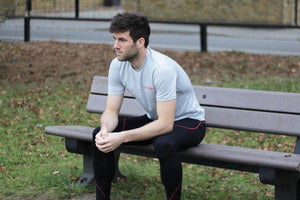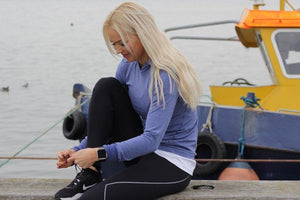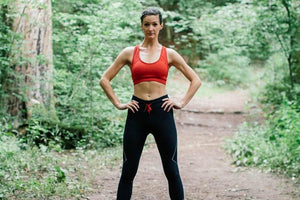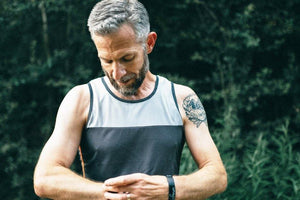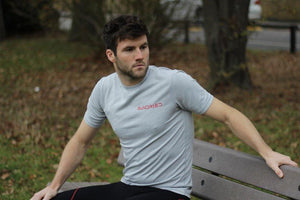
The fashion industry is said to be the second most damaging industry on earth, behind the oil industry.
The 2015 film The True Cost revealed we buy nearly 400% more clothes now than we did just two decades ago - that’s 80 billion new clothes produced every year. It takes 2,700 litres of water just to make one t-shirt. We cannot hide from our clothing's impact.
- By 2030, demand for water will exceed the supply by 40%.
- Cotton is responsible for 2.6% of the global water we use.
- 17 to 20% of industrial water pollution comes from textile dyeing.
- Between 60 million and 75 million people are employed in the textile, clothing and footwear sector worldwide (as of 2014).
- 36 million people are living in modern slavery today, many of whom are working in the supply chains of Western brands.
- In the UK, roughly two million tonnes of clothing and textiles are thrown away every year and only 16% of that waste is ever reused. That’s roughly £140 million worth of waste.
Out of sight, out of mind
The problem with fast fashion is that we just don’t think about the supply chain. When we shop online, our primary focus is the price, and then we think about delivery time and how well we're treated throughout the process. We fail to think about the way the people manufacturing the clothes are treated.
To make clothes, there are people needed to do the weaving, dyeing, cutting, sewing, folding, ironing and packaging. All of these people are part of the supply chain. Many companies are not transparent about their supply chain, and so the consumer has no idea what is happening behind the scenes.
The Rana Plaza disaster in 2013 saw the poor working conditions of garment factories being thrust into the spotlight after a death toll of 1,130 workers and 2,500 injured people buried alive. Rana Plaza forced us to take a harsh look at where our clothing is coming from and the damage it’s doing not only to the planet, but to people.
Lucy Siegle, British journalist, said “brands, retailers and consumers have all become fantastically adept at divorcing fashion from the very fact that it is has been made by an army of living, breathing, human beings with resources which are depleting the environment”.
Every action creates a reaction
The cost of fashion shouldn’t be someone’s life. A 2014 KPMG survey found that 40% of consumers would switch their loyalty to another company if their favourite brand didn’t pay a living wage. We need to create transparency and traceability and take responsibility for our actions.

Activewear can be ethical
Modern fashion has become more than just the way you cover your body, it’s an outward extension of your personality. What you wear should say something about you, your beliefs, values and creative expression. Your activewear probably has a stronger presence in your life than you may realise; you’re wearing gym clothes everyday, sometimes more than once if you train twice and because of the nature of what you’re doing in it, gym clothes need more washing, which in turn can create more impact.
Environmental Impact
Textile choice is paramount to athletic performance and fabrics which are technically savvy often reflect the largest impact on the planet. Whilst Sundried respect our sport to know we need to use materials which wick sweat, stretch and work with our bodies, we also want our fabrics to work towards a better impact on the environment.
Our packaging is reusable, you’re not meant to throw it away. Instead, our Sundried sleeves can be used to store wet training gear, protect your change of clothes from getting wet or dirty or even be used as a laminated sleeve to store your workout plan in the gym, which you can wipe clean and sweat free. 80% of textile waste going to landfills can actually be reused (WRAP, 2015).
Sundried are inspired by the great outdoors. We regularly post on our blog about training outside and encourage our customers to spend more time experiencing nature. This also helps to reduce our carbon footprint, encouraging more time outdoors and less inside using gas and electricity.

It’s not just about your running mileage, it’s about your fashion mileage
How long can you make your clothing last, if it’s been poorly constructed? Sundried want you to get to know our activewear, we want you to know where your clothing was made and how to look after it so you form a quality relationship with your activewear that lasts.
We’ve used high quality materials which break the quickly-made, quickly-thrown, pattern of the fast fashion industry. We want you to have more than a fling with fashion and instead invest in activewear you can treasure. From how it's made to our after care recommendations we’re doing what we can to ensure that our clothing lasts to minimise its environmental impact. Our style is purposely elegantly timeless, so we will always be fashionable, though to us being ethical is always on trend.
80% of the environmental impact of clothing is made after purchase. Sundried continue our ethical ethos through you, our customers, by trusting you to support our activewear by minimising its environmental impact. We have done this by producing our products with fabrics which should be “washed cool and sun dried”, eliminating the need for wasted energy on hot washes and ironing.
One of the biggest obstacles for those wanting to purchase ethically is cost. Despite the fact that cheap clothing could cost lives, cheaper clothing is all that can be afforded. What if we told you wearing ethical activewear was actually more cost effective? Sundried activewear is ethically produced and made from high quality, enduring materials that are sure to outlast their fast fashion counterparts, meaning the eco-conscious choice will pay off in the long run.
Choosing ethical activewear impacts positively on everyone: people, animals and the planet.

Everyday we follow 2 simple, universal actions. We eat and we get dressed.
We need aesthetics to meet ethics in order to future proof the planet for generations to come. You are mindful to not cause harm to others in your everyday life from the people you meet to foods you eat; so why choose clothes that harm people?
Ethically produced activewear can benefit the people who live in the local communities, where the clothing is manufactured. Rest assured Sundried respect our workers, your clothes were manufactured by workers of legal age, who worked in safe, humane conditions, earning a satisfactory salary.




